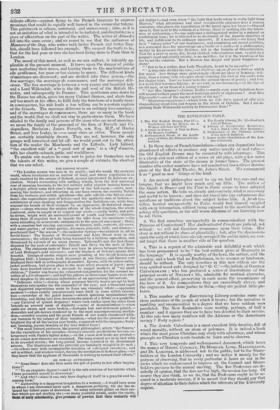THE REVIEWER'S TABLE.
I. The Old English Draina, Part IV.— 4. The Family Library, No. 12—Southey's Englishmen for my Blaney, or, A Life of Nelson. Woman will have her Will. 5. Library of Entertaining Knowledge, 2. A Guide to France. A Visit to Paris. Vol.5. Part 1.—The New Zealanders. By Francis Coghlen. 6. Explanation of the Thirteen Articles 3. Authenticated Proofs of the Legiti- of the Jewish Religion. macy of Olive, the Princess of Culla- 7. Letter to the Shareholders of the Lon- berland. don University.
I. In these days of French translations—when our dramatists have abandoned all efforts to produce any native novelty of real value— the Old English Drama may be recurred to with advantage. This is a cheap and neat edition of a series of old plays, with a few notes illustrative of the state of the drama in former times. The present number (the earlier numbers have not reached us) has a clever frontis- piece of the Red Bull Theatre, St. John's Street. We recommend it as "good as new " things of the kind.
2. An ancient philosopher used to say we had two ears and one tongue, that we might hear much and say little. The author of the Guide to France and the Visit to Paris seems to have adopted the same notion. He tells us, clearly and concisely, what is necessary and useful to be known ; and does not travel into any extraneous dis- quisitions or traditions about the subject before him. A fresh tra- veller, hurried unexpectedly to Paris, would find himself supplied with every information, without being exposed to the mortification of asking silly questions, or the still worse dilemma of not knowing how to ask them.
3. We find ourselves unexpectedly in communication with the Princess of Cumberland ! Her Authenticated Proofs are judicial, not critical : we will not therefore pronounce upon their value. Her story is not without its share or ; but, after the discussions upon the subject which have already occupied the public mind, we can- not forget that there is another side of the question.
4. This is a reprint of the admirable and delightful work which has been pronounced to be "the best written piece of Biography in the language." It is equally worthy of the hero, the author, and the country, and a book that no Englishman, be he seaman or landsman, should be without. The only novelties in this new edition are the very spirited wood cuts designed by" G. C."—the initials of GEORGE CRUICKSHANK ; who has produced a series of illustrations of the principal events of NELSON'S life, admirable for nautical character, and the general effect, preserving in each scene the resemblance of the hero of it. As compositions they are exceedingly clever, and the engravers have done justice to them,—they are perfect little pic- tures.
5. This number of the Entertaining Library contains some cu- rious particulars of the people of which it treats ; but the narrative is rambling and inconsecutive to a degree that we have seldom seen paralleled. The New Zealanders were worthy, perhaps, of half a number : and it appears they are to have two devoted to their service. At this rate how many numbers will the Africans or the Americans occupy ? Forty a-piece ?
6. The Jewish Catechism is a most excellent little treatise, full of sound morality, without an atom of polemics. It is indeed a book which the most pious Christian may study with advantage, and whose precepts no Christian needs hesitate to learn and to observe.
7. This very temperate and well-reasoned document, which bears the names of Messrs. CONOLLY, DE MORGAN, LONG, MACCULLOCH, and Dr. LARDNER, is addressed not to the public, but to the Share- holders of the London University ; and we notice it merely for the purpose of observing, that in every particular it bears us out in the views which we endeavoured to impress on the Council and Share- holders previous to the annual meeting. The five Professors are de- cidedly of opinion, that the fees are too high, the session too long. Of course they also think, as we do, that the Professors ought to be se- cured in a moderate income, if it be meant that they should pay that degree of attention to their duties which the interests of' the University require.


















 Previous page
Previous page